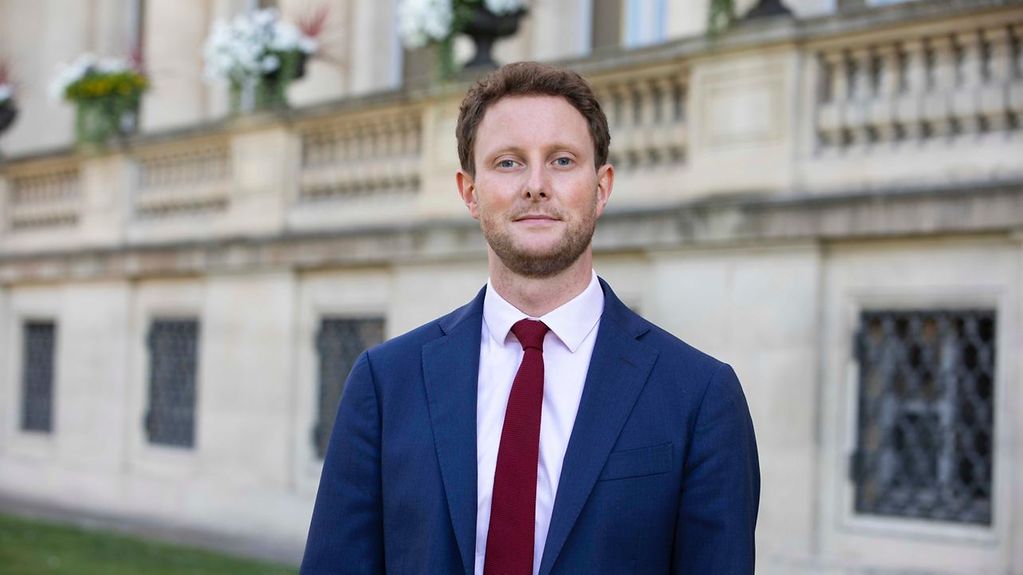Interview with Clément Beaune
On 1 January, France will take over the Presidency of the Council of the European Union for six months. The motto is “Recovery, Strength and a Sense of Belonging”. France’s Minister of State for European Affairs Clément Beaune explains in an interview what exactly France has planned – and why he is particularly interested in German history.
4 min reading time

Clément Beaune is Minister of State for European Affairs and Secretary General for Franco-German Cooperation.
Photo: Ministerium für Europa und auswärtige Angelegenheiten
On 1 January, France will assume the rotating Presidency of the Council of the EU. What will France’s priorities be?
“Recovery, Strength, and a Sense of Belonging” – that is the motto of France’s Presidency of the Council of the EU. Those three elements very accurately summarise the priorities that we intend to give to these six months between 1 January and 30 June 2022. “Recovery” – this will be about getting Europe out of crisis, rebuilding our economies and at the same time accelerating the transition to a sustainable society. “Strength” – this will be about making Europe stronger so that it can assume its proper standing in the international arena. Finally, “a sense of belonging” – this will mean reinforcing the cohesion of Europe, especially on the social front and with a focus on young people and the defence of our values.
“European sovereignty” still plays an important role. What does it mean?
We are living in an age characterised by loss of certainties and the redefinition of international relations. It is clear that Europe has to move on from cooperation within its borders to a Europe capable of defending its interests and convictions against the outside, fully sovereign, free to make its own decisions and master of its own destiny. This is an essential condition, both to ensure the security of the people of Europe and to endure in the international competition of systems.
You want a “Europe with a human face”. What do you mean by that, and what should it look like?
Europe is linked to a certain idea of humanity. It was our continent that saw the birth of democracy, humanism, the spirit of the Enlightenment and human rights. This special history inspires a deeply felt calling: to defend that idea of humanity. What is more, this applies not only in our external relations – internally, too, the social and liberal foundations of our model are being called into question. We must respond by highlighting the singularity of our history and by creating a Europe that is socially strong, for example through the initiatives for a European minimum wage and pay transparency. It is time to mobilise for this human Europe.
2022 is the Year of Youth. In what ways does France intend to foreground young people during its Presidency?
In 2017, during his speech at the Sorbonne, President Emmanuel Macron called for the Erasmus programme to be expanded to include all young Europeans because it imparts an open-mindedness that is uniquely advantageous in adult life. We have already extended it to apprentices and have already doubled the number of beneficiaries. France proposes going further and considering six months of European civic service open to everyone under 25 years of age, for a university or vocational exchange, a placement or a community project. On 9 May, France launched the online consultation “Parole aux jeunes” enabling 50,000 young people aged between 15 and 30 to make their voices heard. The results will be fed into the Conference on the Future of Europe, the conclusion of which, in May 2022, will be a key moment of France’s Presidency.
What do you hope will come out of the Conference on the Future of Europe?
The Conference on the Future of Europe offers a unique chance for all European citizens to voice their ideas, wishes and criticisms for Europe and to sketch out their Europe of tomorrow. The initial work done at the regional conferences in France shows that our citizens are engaged, well informed and full of ideas. I am sure this is the case in all the member states and that the results of the conference will bring us the impetus we need to reform the European Union radically in the years ahead and to fight that fight.
The Franco-German relationship has always been of great importance for the European project. How would you describe it today? How might it drive forward the development of Europe?
Everything around the Franco-German couple changes, including things at the heart of Europe, except the necessity of Franco-German agreement if progress is to be made. To find those compromises, we rely on a multitude of Franco-German institutions, rendered necessary by our differences in approach, and on a unique method of working. That method can be seen in regular meetings that irrigate the entire administration. What makes our cooperation unique is the will to produce syntheses not only for obvious historical reasons, but also because experience has taught us that it is both in our respective interests and in the interest of a common European good – of peace and prosperity. Let’s be clear: Franco-German agreement is not enough to impose decisions at the European level – but, conversely, if the Franco-German engine breaks down, it is the whole of the Union that suffers.
What are your personal ties to Germany?
As a child, one of my most formative experiences was a trip to Berlin with my parents shortly after the Wall came down. It was thanks to that trip that I became so interested in history – the history of Germany, of relations between our two countries, of Europe as a whole. And from that trip, I retain a keen interest in Germany. I have also built up numerous friendships over the years, thanks to the close cooperation with my German counterparts.